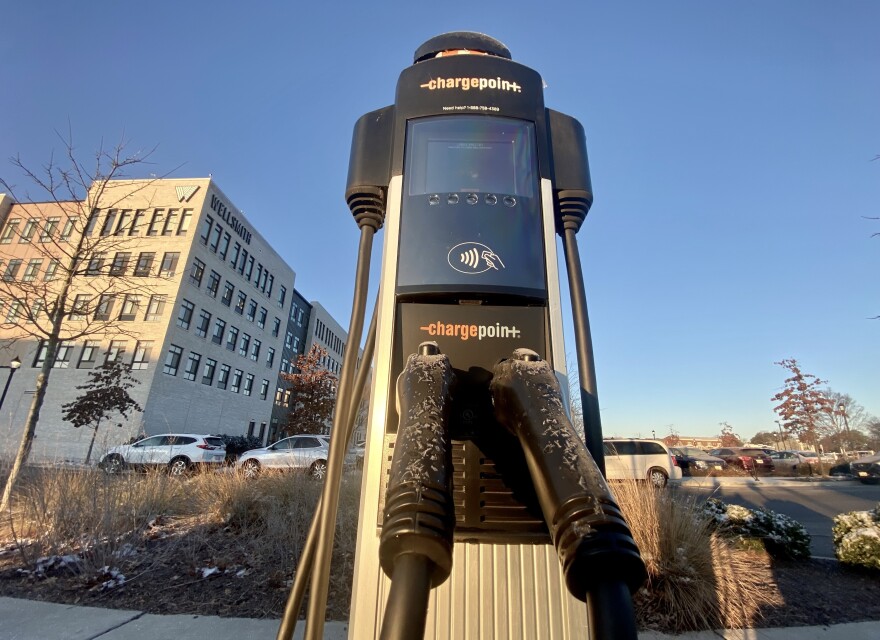A handful of bills that would decouple Virginia from California’s vehicle emissions rules were defeated in a Senate committee this week. The regulations are set to take effect before spring.
Republicans put forward three bills each in the Senate and House of Delegates. In the upper house, Democrats used their majority on the Agriculture, Conservation and Natural Resources committee to reject the proposals. A similar end is likely in the lower house.
In 2021, Gov. Ralph Northam and the Democrat-led General Assembly approved a measure requiring state regulators to adopt Advanced Clean Cars standards, which are set by the California Air Resources Board. They’d require 100% of new passenger vehicles sold in Virginia to be electric by 2035 — though 20% of those can be plug-in hybrids.
The federal Clean Air Act gives states two options to meet passenger vehicle emissions standards: Follow the federal standards — set by the Environmental Protection Agency — or subscribe to California’s.
Sens. Richard Stuart (R-Franklin), Ryan McDougle (R-Hanover) and John McGuire (R-Goochland) sponsored the legislation.
Stuart has carried a bill every year to repeal the standards since they were approved by the GA in 2021.
“I know that’s the definition of insanity, but I’m gonna keep going,” Stuart said.
Stuart said the mandates don’t line up with the reality of the market.
In 2024, 22% of new cars that manufacturers send to dealers must be EVs, though about 9% of new cars bought in the commonwealth during the first eight months of 2023 were EVs, according to the Virginia Automobile Dealers Association.
According to the Southern Environmental Law Center, Zero Emissions Vehicle standards will result in about 8% of new car sales being EVs in 2024. The standards include a credit scheme and allow for the sale of some non-ZEVs — like plug-in electric hybrids that meet Super-Ultra-Low Emissions Vehicle standards.
Stuart told the Senate committee Tuesday that EV infrastructure is not where it needs to be in much of the commonwealth. He argued that the technology isn’t ready for use outside of cities, given the lack of chargers and some vehicles having a short driving range — particularly in cold weather or while towing heavy loads.

McDougle also brought up cost.
“The constituents that we represent can’t afford the vehicles that will get us to this goal,” McDougle said.
McGuire called the measure “a bill to un-California Virginia.”
Democrats on the committee said the regulations are an essential part of their efforts to reduce greenhouse gas emissions.
“We know as a society that we have a problem with pollution,” said Sen. Barbara Favola (D-Arlington).
According to the Energy Information Administration, transportation made up most of Virginia’s energy-related carbon dioxide emissions in 2021 at 98 million metric tons.
If Virginia were to delink from California’s standards, the state would have to adopt EPA’s emission standards, which the federal agency wants to update. The agency estimated that update would require about two-thirds of new passenger cars sold in 2032 to be EVs.
“The federal emissions standards are going to be in alignment with California’s standards pretty quickly,” said Sen. Ghazala Hashmi (D-Chesterfield), who serves on the Agriculture, Conservation and Natural Resources committee.
Committee chairperson Sen. Dave Marsden (D-Fairfax) said it would take time to figure out how best to implement these standards and other major legislation — like the Clean Economy Act.
“They are aspirational [laws]. There are problems that have arisen in these aspirational [laws], and we need to come up with solutions,” Marsden said, hinting at a statewide conference on the implementation of those laws in the future.
Ralston King, vice president of legislative affairs for the Virginia Automobile Dealers Association, said before session that Virginia auto dealers have already invested heavily in EVs and their required infrastructure, including charging stations and utility connections.
“In Virginia, we’ve spent close to $350,000, on average, per dealership,” King told VPM News. "We've committed our financial resources because we want to sell EVs.”
VADA supported the 2021 measure adopting California’s standards with two contingencies — state funding for point-of-sale EV rebates and state funding to build out EV charging infrastructure. So far, those haven’t materialized.
There are a range of proposals to build out charging infrastructure in both chambers, and SELC attorney Trip Pollard said he expects budget amendments for that and consumer rebates to come up this year.
But with Democrats in control of the legislature and Republican Gov. Glenn Youngkin in the executive branch, King isn’t convinced those programs will be funded.
“I don't think we're going to be under the belief that the governor will want that,” King said. “And I'm not frankly sure whether the Appropriations and Finance committee in both the House and the Senate will want to fund that as well.”
King said VADA wasn’t going to take a stance on rolling the regulations back this year.
“We still want to kind of see where things take us,” King said.
The vehicle regulation, which was approved by the Virginia Air Pollution Control Board in 2021, will be published in the Virginia Register of Regulations on Feb. 12. Regulations generally take effect 30 days after publication.



